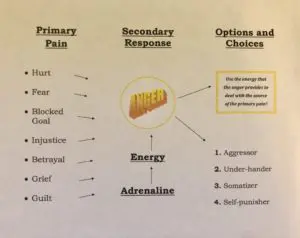When is Anger Constructive?
When is Anger Constructive?
 In this age of fast-pace, high-demand, and growing-workload, we are all stretched more than ever before. We have shorter fuses, less patience, and more frustration both at work and at home. As a leadership coach, I help leaders become more aware of what triggers them, the emotions these triggers elicit, and ways to constructively manage these emotions in their daily interactions. These are key elements of emotional intelligence, which research has shown to be a better predictor of success at work and in life than cognitive ability (IQ). According to the Center for Creative Leadership, “75% of derailed careers are for reasons related to emotional competencies, including inability to handle interpersonal problems.” In my experience, what gets leaders into trouble in the workplace is how they respond under stress and how they treat other people, not their technical capability or how smart they are.
In this age of fast-pace, high-demand, and growing-workload, we are all stretched more than ever before. We have shorter fuses, less patience, and more frustration both at work and at home. As a leadership coach, I help leaders become more aware of what triggers them, the emotions these triggers elicit, and ways to constructively manage these emotions in their daily interactions. These are key elements of emotional intelligence, which research has shown to be a better predictor of success at work and in life than cognitive ability (IQ). According to the Center for Creative Leadership, “75% of derailed careers are for reasons related to emotional competencies, including inability to handle interpersonal problems.” In my experience, what gets leaders into trouble in the workplace is how they respond under stress and how they treat other people, not their technical capability or how smart they are.
Most of the time, we are on auto-pilot. We go about our day without much conscious thought to how we are feeling or how this affects our behavior and performance. When we are in high-stress situations or situations that trigger anger in us, we usually react automatically without thinking. The fight or flight response kicks in, and the logical part of our brain actually shuts down, so we have difficulty thinking rationally. The emotional part of our brain takes over, and we react based on emotions of fear, frustration, or anger. Cortisol and adrenaline course throughout our bodies, giving us the energy needed to take action – either fight or flee as a survival mechanism. Because of this, anger is a very powerful and energy-producing emotion. Anger must be harnessed appropriately, or it could cause great harm.
In this podcast, The Anger Episode, from my friend RJ Helguera’s inspiring program New Normal, therapist Luann Adams brilliantly simplifies and break downs the complexity of anger (see diagram graphic). She explains that anger is not a primary emotion. It’s actually a secondary response to a primary pain of hurt (physical or emotional), fear, a blocked goal, injustice, betrayal, grief or guilt. The healthy and constructive way to deal with anger is to use the energy that the anger provides to deal with the source of primary pain. We can do this by asking, “What am I feeling? What is it about? What is the primary pain? What are my options? What do I want to do about this?”, and then respond accordingly with purposeful intention. Movements against injustice throughout history are great examples of constructive uses of anger. Incredibly positive change can happen when anger is channeled appropriately toward the source of primary pain. Unhealthy ways to deal with anger are to become: 1) an aggressor (lash out at others); 2) an under-hander (passive aggressive); 3) a somatizer (swallow the anger and push it down, resulting in health issues); or 4) a self-punisher (beat ourselves up for feeling angry). In each of these four roles, the behaviors are destructive and do not address the source of primary pain. Therefore, the source of the anger is left unresolved.
I absolutely love this anger diagram because it shows that even though anger is a physiologically powerful and energy-producing emotion, we still have the ability to pause, breathe, reflect, and choose our response instead of just reacting on impulse. It takes a great amount of self-awareness and self-management (emotional intelligence), but we can learn to do this with practice. In fact, we must learn to do this and practice it. Our health, emotional well-being, careers, and relationships depend on it.
“Between stimulus and response there is a space. In that space is our power to choose our response. In our response lies our growth and our freedom.” – Viktor Frankl
“Every human has four endowments – self awareness, conscience, independent will, and creative imagination. These give us the ultimate human freedom…The power to choose, to respond, and to change.” – Dr. Stephen Covey
Coaching Readiness Assessment
Try our FREE Online Coaching Readiness Assessment to evaluate your readiness for leadership coaching.
LOCATION
Primary Location
3010 Highland Parkway, Suite 200
Downers Grove, IL 60515, US


